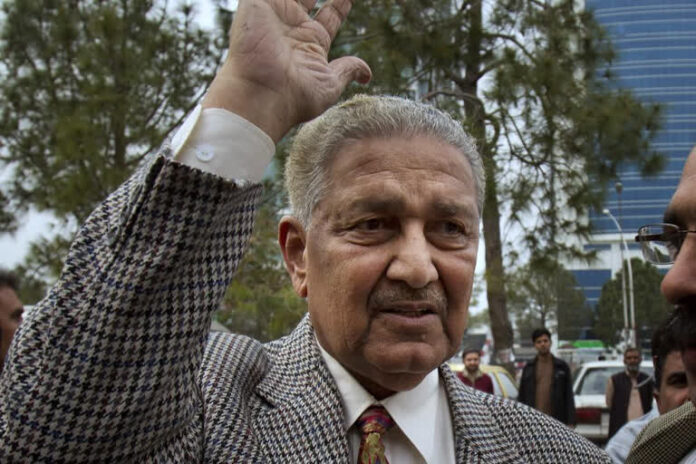| Translate This News In |
|---|
Abdul Qadeer Khan, the controversial man credited with inventing Pakistan’s nuclear bomb, died Sunday after a protracted illness, according to Pakistan’s interior minister. He was 85 years old at the time. In the early 1970s, Khan set Pakistan on the route to become a nuclear state. He died in a hospital in Islamabad, according to Interior Minister Sheikh Rasheed Ahmad. He didn’t go into detail. Khan was embroiled in controversy from the moment he returned to Pakistan in the 1970s after working at a nuclear development facility in the Netherlands.
According to research conducted by the Carnegie Endowment for International Peace, he was then suspected of stealing centrifuge uranium enrichment technology from a Dutch facility, which he eventually used to construct Pakistan’s first nuclear weapon. Khan, who graduated from the Catholic University of Leuven in Belgium with a degree in metallurgical engineering, offered to start Pakistan’s nuclear weapons programme in 1974, after India detonated its first “peaceful nuclear explosion.”
He offered technology for Pakistan’s nuclear weapons development to then-Prime Minister Zulfikar Ali Bhutto. Bhutto accepted the offer, still hurting from the loss of East Pakistan, which became Bangladesh, in 1971, as well as India’s capture of 90,000 Pakistani soldiers. “We (Pakistanis) will eat grass, even go hungry, but we shall have our own (nuclear bomb),” he famously stated.
Pakistan has pursued its nuclear weapons programme in partnership with India since then. After conducting tit-for-tat nuclear weapons tests in 1998, both countries were proclaimed nuclear weapons nations. Pakistan’s nuclear programme, as well as Khan’s role in it, has long been a source of allegations and criticism.
After the United States sanctioned Pakistan for its nuclear weapons programme in the 1990s, Khan was accused by the US of selling nuclear secrets to Iran and North Korea. For ten years, consecutive US presidents certified that Pakistan was not building nuclear weapons during the Soviet occupation of neighbouring Afghanistan. The approval was required by American law in order for the United States to send supplies to anti-communist guerrillas through Pakistan.
However, just months after the Soviet soldiers left Afghanistan in 1989, Washington imposed punishing sanctions on Pakistan, thereby terminating all military and humanitarian aid to the country. Pakistan has been accused of transferring nuclear weapon technology to North Korea in exchange for nuclear-capable No-Dong missiles. While the beginning of Pakistan’s nuclear collaboration with North Korea is difficult to define, it most likely began in the mid-1990s, according to a 2003 Congressional Research Report.
Khan was hailed as a hero and the father of the nuclear weapon in his own country of Pakistan. He was dubbed the “Father of the Islamic Nuclear Bomb” by radical religious groups. After details of Khan’s suspected sales of nuclear secrets came under further examination in 2001, Pakistan’s authoritarian President General Pervez Musharraf rejected Khan. Khan slammed Musharraf and his attempts to separate the government from his actions, insisting that he was never involved in any secret sales or secret nuclear weapons technology transfers.
Khan had largely avoided the spotlight in recent years, and condolences from colleagues academics and Pakistani officials began quickly after his death. Imran Khan, Pakistan’s prime minister, dubbed him a “national idol” for his nuclear weapons programme “gave us with assurance against a much larger and more aggressive nuclear adversary. He was a national hero for the Pakistani people.”
Dr. Samar Mubarakmand, a fellow scientist, described Khan as a national treasure who battled Western efforts to stop Pakistan’s nuclear development. “It was unimaginable for the west that Pakistan would make any breakthrough,” he continued, “but they had to recognise Dr. Khan’s feat of producing Pakistan’s nuclear weapons.” Khan died after a long illness at the KRL Hospital in Islamabad. He was to be buried with full state honours at a mosque in the capital on Sunday afternoon.


















